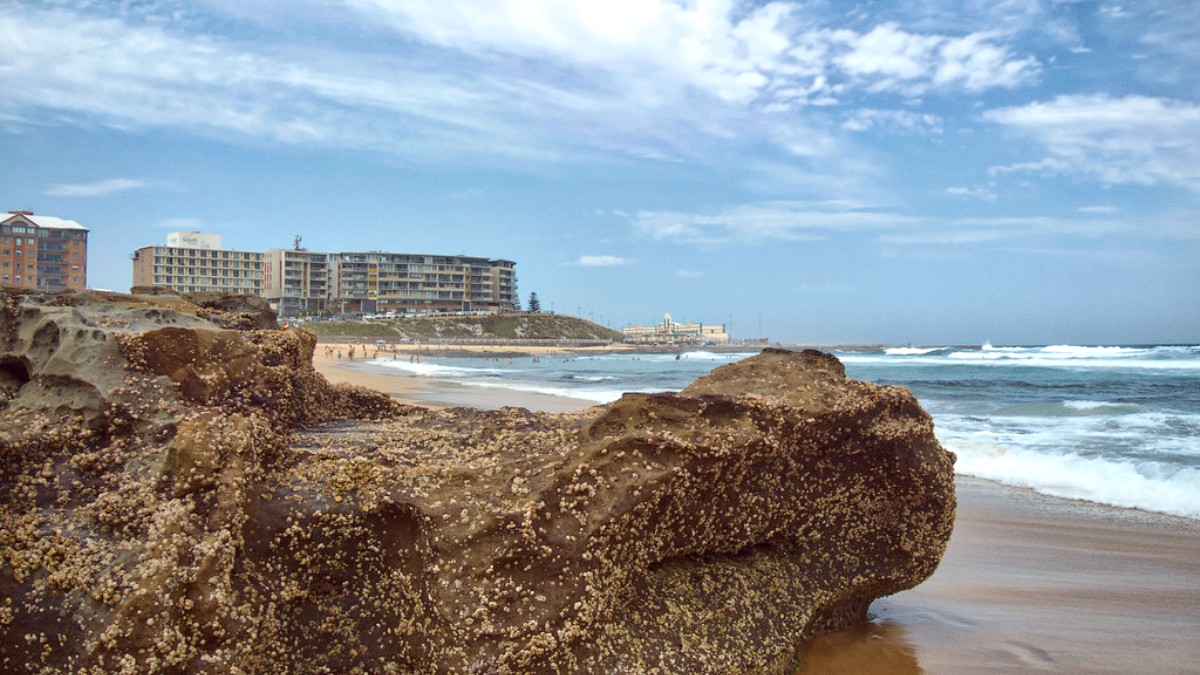
New South Wales, Australia
From the dramatic cliffs of its coastline to the lively cafes lining its streets, Newcastle provides a welcoming atmosphere that combines urban sophistication with beachside ease. Mornings often begin with a walk along the iconic Bathers Way, watching surfers catch waves as the sun rises over the Pacific Ocean. Afternoons might lead one through historic laneways adorned with street art, exploring local boutiques, or delving into the city’s rich past at its museums. Evenings offer a diverse culinary scene, from waterfront dining with views of passing ships to hidden gems serving global flavors. Newcastle’s appeal lies in its genuine nature, its beautiful setting, and the friendly disposition of its residents.
Newcastle's location offers easy access to diverse landscapes, from ocean beaches and coastal paths to the fertile Hunter Valley wine region.
Its position at the mouth of the Hunter River provides a dynamic waterfront, blending natural beauty with industrial heritage.
Newcastle's history is as layered and compelling as its diverse landscape, deeply rooted in its origins as a penal colony and its subsequent rise as an industrial powerhouse. The area was originally inhabited by the Awabakal and Worimi Aboriginal peoples, who had lived there for thousands of years, with a rich cultural heritage tied to the land and sea. Their connection to the land continues to be a meaningful aspect of the region’s identity.
As the penal settlement eventually closed, Newcastle transitioned into a free town, and its coal mining and shipping industries rapidly expanded. Throughout the 19th and 20th centuries, Newcastle became a major industrial center, not just for coal, but also for steel production with the establishment of the BHP (Broken Hill Proprietary) steelworks in 1915. For decades, the steelworks defined Newcastle’s economy and character, drawing workers from around the world and shaping the city’s working-class identity. The closure of the steelworks in 1999 marked a pivotal moment, leading to a period of economic adjustment.
European settlement began in 1801, initially for coal collection, leading to the establishment of a penal settlement in 1804.
A historic ocean pool carved into rock, built by convicts in 1820, a tangible reminder of the city's penal past.
Perched on a headland, this site illustrates the city's early defensive needs and its wartime contributions.
Through the 19th and 20th centuries, coal mining and steel production defined Newcastle's economy and identity.
The city embarked on a transformation after the steelworks closure, revitalizing its CBD and waterfront with cultural initiatives.
The city embarked on a transformation, leveraging its natural beauty and heritage. Investments in urban renewal, infrastructure, and cultural initiatives revitalized the CBD and waterfront areas. Historic buildings found new life as cafes, restaurants, and galleries.
The city's industrial past now serves as a foundation for its contemporary narrative, celebrated in places like the Newcastle Museum, which details its journey from coal to steel and beyond.
This guide intends to reveal the true essence of this city, guiding one through its attractions, experiences, and local rhythms. Prepare to find a destination that surprises and delights, presenting a truly authentic Australian experience without the overwhelming crowds found in larger metropolitan centers.
Newcastle is a place that leaves a lasting impression, a city that invites exploration, relaxation, and connection with its distinctive charm.
Newcastle, New South Wales, presents itself as a dynamic destination that skillfully blends its rich industrial and colonial past with a forward-thinking, lifestyle-oriented present. It is a city of stunning natural assets, where the urban fabric seamlessly meets the vast expanse of the Pacific Ocean. Visitors quickly notice the omnipresent coastline, which dictates much of the city's relaxed pace and recreational opportunities.
The core of Newcastle offers a compact yet diverse urban experience. The central business district, revitalized in recent years, features a mix of historic architecture and contemporary developments. Here, one discovers a strong cafe culture, independent boutiques, and a growing array of dining options that reflect a sophisticated palate. The city’s East End, with its charming terraced houses and proximity to both the harbor and the ocean, provides a picturesque setting for strolling and exploring. A short walk from the city center leads to the iconic Newcastle Beach and the dramatic coastal pathways, including the breathtaking Newcastle Memorial Walk, which features panoramic views and a poignant connection to local history.
The city’s string of patrolled beaches, from Nobbys to Merewether, draws surfers, swimmers, and sunbathers. The vast Merewether Ocean Baths, a historic and expansive ocean pool, gives a sheltered spot for lap swimming or family enjoyment.
The city’s close proximity to the Hunter Valley, Australia's oldest wine region, means world-class wineries and gourmet food experiences are just a short drive away, making for an ideal day trip.
Inland, Blackbutt Reserve offers a chance to encounter native Australian wildlife in a natural bushland setting, giving a contrast to the coastal activities.
Newcastle's appeal extends to its cultural scene, with a respected art gallery, a museum that details the city’s fascinating story, and the grand Civic Theatre hosting a range of performances.